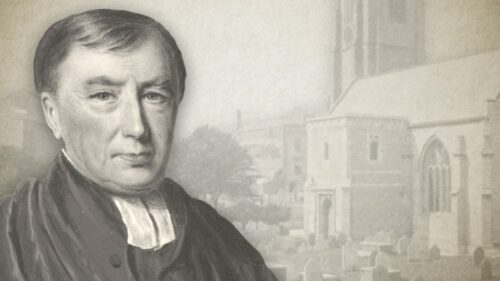
April 14—Morning Devotion
“When Jesus therefore had received the vinegar, he said, it is finished.”—John 19:30
Perhaps these words formed the sixth cry of the Lord Jesus on the cross. The glorious close of all his sufferings was now arrived; and full of these high ideas which occupied his holy mind, he cried out, “It is finished!” What is finished? Redemption-work is finished. All the long series of prophecies, visions, types, and the shadows of good things to come, which pointed to Jesus and redemption by him, were now finished in their accomplishment. The law was finished in its condemning power; and the gospel commenced its saving influence. Jesus, by that one sacrifice now offered, had for ever perfected them that are sanctified. The separation between Jew and gentile was now finished and done away for ever. Jesus had now “gathered together, in one, all the children of God which are scattered abroad.” The iron reign of sin and Satan, of death and hell, were now broken in pieces by this stone cut out of the mountain without hands; and life and immortality, pardon, mercy, and peace, were brought to light, and secured to the faithful, by this finished redemption of the Lord Jesus Christ. The peace, the love, the favour of God the Father, was now obtained; and that spiritual kingdom of the Lord Jesus, which shall have no end, was from this moment set up in the hearts and minds of his people. The sure descent of the Holy Ghost was now confirmed; and the Lord Jesus already, by anticipation, beheld his Israel of old, and his gentile church, as well as Ethiopia and the multitude of the isles, stretching forth their hands unto. God. Full of these and the like glorious prospects the mind of Jesus was filled; and having received the vinegar, as the last prophecy remaining then to be completed, he cried out, “It is finished!” My soul, never let these precious, precious words of Jesus depart from thy mind. Do by them as Moses commanded Israel concerning the words he gave them; “let them be in thy heart, and in thy soul; bind them as a sign upon thine hand, and let them be as frontlets between thine eyes.” Tell thy God and Father what thy Jesus hath told thee—”It is finished!” He hath finished redemption for thee; and He will finish redemption in thee. He hath destroyed death, both satisfied and glorified the law, taken away the curse, made full restitution for sin, brought in an everlasting righteousness, and opened the glorious mansions of the blessed as the home and rest of all his people. Oh my soul, let these dying words of thy Jesus be made by thee as an answer to all thy prayers, and begin that song to the Lamb, which ere long, thou wilt fully and loudly sing among the church above—”Worthy is the Lamb that was slain; for thou wast slain, and hast redeemed us to God by thy blood.”
Robert Hawker (1753-1827) was an Anglican (High-Calvinist) preacher who served as Vicar of Charles Church, Plymouth. John Hazelton wrote of him:
“The prominent features…in Robert Hawker's testimony…was the Person of Christ….Dr. Hawker delighted to speak of his Lord as "My most glorious Christ.” What anxious heart but finds at times in the perusal of the doctor's writings a measure of relief, a softening, and a mellowing? an almost imperceptible yet secret and constraining power in leading out of self and off from the misery and bondage of the flesh into a contemplation of the Person and preciousness of Christ as "the chiefest among ten thousand and the altogether lovely." Christ and Him crucified was emphatically the burden of his song and the keynote of his ministry. He preached his last sermon in Charles Church on March 18th, 1827, and on April 6th he died, after being six years curate and forty-three years vicar of the parish. On the last day of his life he repeated a part of Ephesians 1, from the 6th to the 12th verses, and as he proceeded he enlarged on the verses, but dwelt more fully on these words: "To the praise of His glory Who first trusted in Christ." He paused and asked, "Who first trusted in Christ?" And then made this answer: "It was God the Father Who first trusted in Christ."
Robert Hawker on the Biblical Covenants (Complete)
Robert Hawker's Poor Man's Morning Portions





